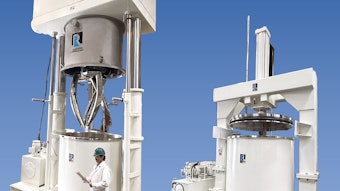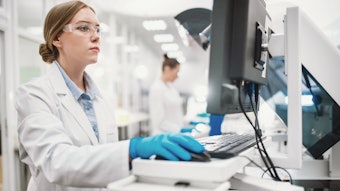
Enzymit Inc., a syn-bio production platform company, announced the close of a $5 million seed round to accelerate the development of its computational design platform to engineer new-to-nature enzymes for bio-production. These designer enzymes reportedly could "replace nearly every inefficient, unsustainable and polluting chemical reaction used in modern production methods."
According to the company, bioproduction is challenged by a lack of enzymes and organisms suitable for production; and even when appropriate enzymes exist, cellular manufacturing (fermentation) is beset by toxicity problems, production of side products, sub-optimal enzyme ratios and varying temperature optima, making the development of new production organisms incredibly difficult. Enzymit's approach reportedly eliminates the problems associated with cellular manufacturing and cuts production costs and development times.
Cell-free Efficiencies
Enzymit’s platform technology creates enzymes that can not only catalyze new reactions but also outperform existing enzymes, the company reports. The enzymes are used in a "cell-free" process—meaning using the enzymes directly without requiring a living organism (like in fermentation).
"Using clean enzymes without the redundant cellular mechanisms makes the process orders of magnitude more efficient," Gideon Lapidoth, Ph.D., CEO and co-founder explains. "One of our key breakthroughs [is the] designer enzymes don't require ATP, a very expensive molecule which is essential for many natural reactions," Lapidoth adds. "By removing this dependency on ATP, we can catalyze many reactions cheaper and more efficiently than ever before."
See archived: Moving Toward Microbes; Bio-engineering a New Cosmetic Reality
Utility and Applications
An example of how this process might be used for personal care is the production of molecules with desired properties that exist in nature—such as "rare sugars," including the biopolymers hyaluronic acid or chitin—that would otherwise be too expensive or non-sustainable to produce from natural sources. "Our designer enzymes allow us to cheaply manufacture these products by 'hacking' processes that don't exist in nature," Lapidoth explains.
"Enzymit is developing a novel process for hyaluronic acid," he continues. "This product is currently manufactured using fermentation, which is fraught with issues. Enzymit is developing a cell-free process that will dramatically reduce the cost."
Design and Disruption
According to Lapidoth, the key challenge the company faced in developing the technology was the actual enzyme design part. "Once you obtain the enzyme with the desired properties the upscaling is actually quite simple," he says.
"... The key technological advancement that allowed us to create our new enzymes is our computational algorithms. Enzyme design (and proteins in general) are incredibly complex systems. The advancement of deep learning technologies has had an enormous impact on addressing this insane complexity, making it manageable."
Enzymit's aspiration, according to Lapidoth, is to disrupt how many of our daily consumables are produced. "If we are successful, then many of these products will become much cheaper and accessible but without any [of the] environmental downside that usually comes with accelerated development and production."
Further Developments
Enzymit is also developing an enzymatic process that can convert carbon from the air to novel bio-polymers cheaper than before, and plans to challenge some of the largest players with its innovative platform and products. With this new investment, the company is well-positioned to take on the challenge and significantly impact this critical market.
See archived: AI-aided Pathways Effectively Synthesize Naturally Occurring Compounds
"While there is no dispute that humanity's future relies on biomanufacturing, if we expect to maintain our standard of living in the face of increasing global pressures and growing population, nature hasn't supplied us with all of the enzymes humanity needs," said Lapidoth. "This is the bottleneck Enzymit aims to solve."
The current biomanufacturing industry is valued at US $100 billion annually, in light of its potential. According to Enzymit, however, this is a fraction of the $4 trillion global chemical industry it aims to replace.









